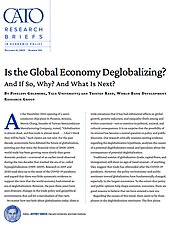No matter how one feels about globalization today, there is wide consensus that it has had substantial effects on global growth, poverty reduction, and inequality (both among and within countries)—not to mention its political, societal, and cultural consequences. It is no surprise that the possibility of its reversal has become a central question in policy and public discourse. Our research critically assesses existing evidence regarding the deglobalization hypothesis, analyzes the causes of a potential deglobalization trend, and speculates about the consequences of potential deglobalization.
Traditional metrics of globalization (trade, capital flows, and immigration) still show no sign of trend reversal—if anything, they suggest that trade has rebounded after the COVID-19 pandemic. However, the policy environment and public sentiment toward globalization have fundamentally changed, especially in the largest economies. To the extent that policy and public opinion help shape economic outcomes, there are good reasons to believe that we have entered a new era.
Regarding the causes of this trend, there seem to be three phases in the deglobalization sentiment. The first phase started around 2015 with concerns about the impact of import competition from low-wage countries (especially China) on the labor market and the impact of refugee flows, primarily in Europe. Such concerns made the public receptive to protectionist policies. This phase was marked by Brexit and by the United States and China increasing tariffs on one another, the economic effects of which were meaningful but still not substantial enough to reverse decades-old globalization trends.
The second phase played out during the COVID-19 pandemic when new arguments against trade emerged. Some attributed temporary shortages of personal protective equipment and other items to the fragility of global supply chains. Demands for greater resilience through greater dependence on domestic production provided a novel justification for reshoring economic activity. Our research suggests that the evidence does not support these claims and that, if anything, trade increased economies’ resilience during the COVID-19 pandemic: in the quarter beginning in March 2020, though the value of US imports declined, importing firms sought new international suppliers at a higher rate than usual and were less likely to separate from existing suppliers. While the demands for resilience did not have any direct implications for policy or trade during this period, and while trade actually grew quickly in 2021, the extensive coverage of the topic in the press further contributed to the notion that globalization had harmful effects to the domestic economy and prepared the ground for the next phase of deglobalization sentiment.
The third phase began with the Russian invasion of Ukraine in February 2022 and provides perhaps the strongest argument to date for rethinking globalization: concerns about national security. According to this argument, Europe’s reliance on Russia for energy exposes the fragility of a global supply system based on hyperspecialization. New demands have emerged to decouple not only from Russia but from any country that is not considered a friend, and a new term has entered the international trade vocabulary: friendshoring. The United States took strong policy actions that included targeting China with sweeping export restrictions in the semiconductor sector. These developments can plausibly be considered the markers of a new era.
Given that these trends are only a few months old, any assessment of their consequences is highly speculative. With this caveat in mind, our research considers some possible effects of deglobalization. First, increased friendshoring could make countries more resilient to geopolitical shocks, such as war, but decrease resilience to other shocks, such as pandemics. Second, deglobalization could slow growth and innovation, especially as researchers and firms in the United States and China would interact less with each other. Third, less foreign competition through trade and immigration could raise prices and wages in the United States. Fourth, as advanced economies trade less, economic development and poverty reduction could slow in small, low-income countries that have relied on exports.
The future of globalization is highly unknown, but one thing is certain: there is no longer support for market-driven, unbridled globalization. Governments are now investing to reallocate international supply chains from their free-market position. A challenge in this new era is that such investments are motivated by objectives that are hard for researchers and the public to evaluate. When globalization was motivated primarily by the objective of economic efficiency, aggregate well-being and distributional effects could be quantified in economic models. In contrast, there is not yet a quantitative benchmark for how much resilience is optimal, partly because national security threats and their diminution can be difficult to verify without security clearance. Researchers can make progress by developing tools to evaluate the impacts of trade and industrial policy on these outcomes.
NOTE
This research brief is based on Pinelopi Goldberg and Tristan Reed, “Is the Global Economy Deglobalizing? And If So, Why? And What Is Next?,” Brookings Papers on Economic Activity, March 29, 2023.

